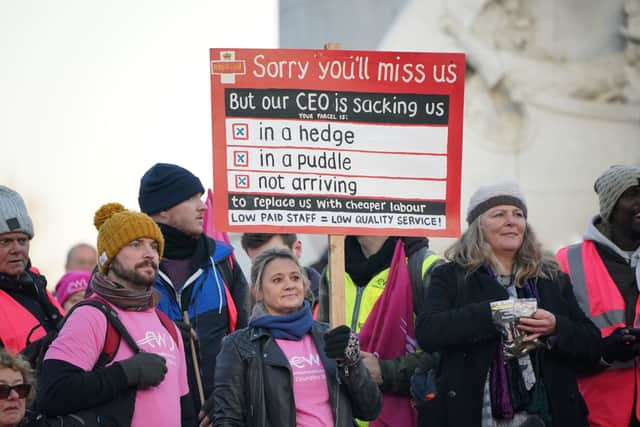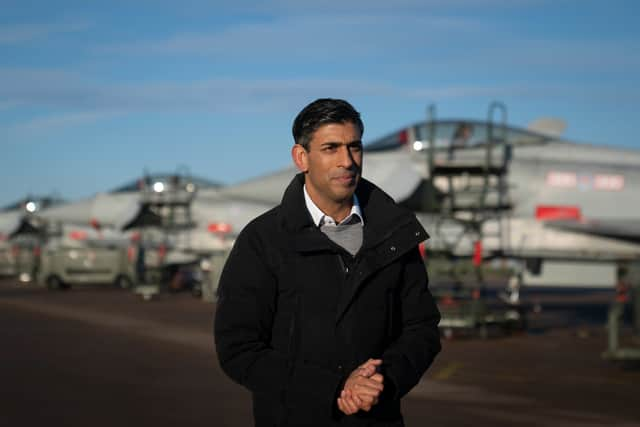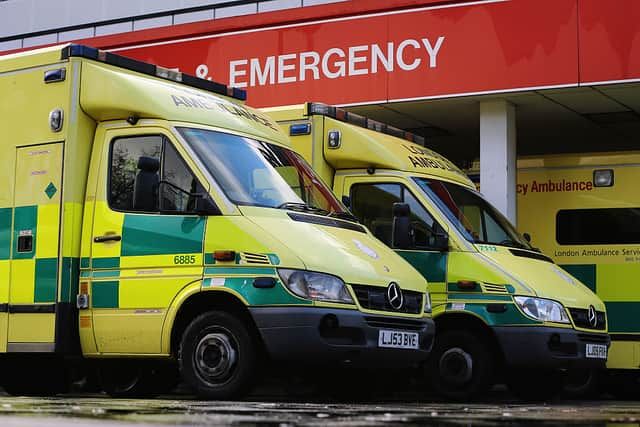December strikes: government response explained as train, mail and nurse walkouts continue across UK
and live on Freeview channel 276
The UK is bracing for the biggest wave of industrial action in decades over the coming weeks, with the health and travel sectors set to be the worst-hit.
Nurses, ambulance staff, rail workers, Royal Mail employees and Border Force officials are all planning walkouts before Christmas, as unions continue to strike over pay, working conditions and staffing issues.
Advertisement
Hide AdAdvertisement
Hide AdSome industrial action, such as that in the travel industry, has been taking place for months - with train unions RMT and Aslef staging walkouts since the summer. But strikes within the NHS are newer territory, with the Royal College of Nursing taking action for the first time in its history.
The government now considering its approach for tackling the mass walkouts, with response tactics from Prime Minister Rishi Sunak ranging from drafting in army personnel to creating legislation that would limit certain sectors’ ability to strike. There will also reportedly be an emergency Cobra meeting on Monday (12 December), where ministers will discuss plans to curb disruption this winter.
But what exactly is the government doing about industrial action, and what plans do we have in the future? Here’s what we know so far.


Cobra meetings
Cobra is the government’s emergency response committee, so the fact that meetings are being planned and held is a clear indication of the severity of the situation. The first meeting will be held on Monday (12 December) and chaired by Chancellor of the Duchy of Lancaster Oliver Dowden.
Advertisement
Hide AdAdvertisement
Hide AdIt will be attended by transport, health, defence and Home Office ministers, who will discuss what action is best to take with regard to the industrial action. A second meeting is set to take place on Wednesday (14 December), the day before nurses across England, Wales and Northern Ireland are scheduled to stage their first walkout.
Dowden has already urged unions to call off the “damaging” strikes, remarking: “The stance the unions have taken will cause disruption for millions of hardworking people over the coming weeks. The government will do all it can to mitigate the impact of this action, but the only way to stop the disruption completely is for union bosses to get back round the table and call off these damaging strikes.”
Some of the unions have argued that instead of meeting each other, ministers should meet them to negotiate pay rises and other demands.


Army services
While ministers may be brainstorming new ideas in their emergency meeting, they will also likely be discussing the practicalities of their existing plans - such as to draft in army personnel to take the place of striking workers.
Advertisement
Hide AdAdvertisement
Hide AdThe military will stand in for Border Force officers at airports across the country and will also be trained up to help frontline health workers in the NHS. Some will be driving ambulances during UNISON’s walkout, and others will be assisting on hospital wards.
UK Prime Minister Sunak has said that “many” Armed Forces personnel will miss their Christmas as a consequence of covering public services strikes. He told reporters: “I had the opportunity to say thank you to some of our Armed Forces personnel because many of them are going to miss Christmas to help us deal with the disruption from strikes. Whether that’s manning border posts or driving ambulances, we all owe them an enormous debt of gratitude.”
But according to The Telegraph, many of those in the military believe it is "not right" for soldiers - who are banned from striking themselves - to replace striking public sector workers, especially when it comes to those who earn more than them.
One source told the paper: “You’ve only got to look at a private soldier on £22,000 a year and whose pay scales have not kept up with inflation for the last decade having to give up Christmas, or come straight off operations, to cover for people who want 19% and are already paid in excess of what he or she would be, and it’s just not right.
Advertisement
Hide AdAdvertisement
Hide Ad“We’ve got to the stage now where the government’s first lever it reaches for every time there is any difficulty, whether it’s floods, strikes, all the rest of it, is the Armed Forces, as opposed to it being the last resort.”
Senior military figures are also understood to have warned ministers that the move could risk weakening the "operational capability" of the military to respond to potential threats.


Anti-strike legislation
A Bill has been introduced to Parliament that would ensure minimum service levels on transport networks during rail strikes, as Sunak insisted ministers are “looking at all options” to protect the public from strikes.
The new legislation is yet to be debated by MPs and peers, but the government is also already considering extending the laws to prevent walkouts from emergency service workers such as nurses and ambulance staff. Again, Sunak declined to give specific details, but told reporters at an RAF base in Lincolnshire, England: “What I can say is my priority is to always be reasonable – and that’s what we’re going to continue to do – but also to make sure we protect lives and minimise the disruption to people’s lives.”
Advertisement
Hide AdAdvertisement
Hide AdEducation Secretary Gillian Keegan has voiced her support for the possible extension of legislation, suggesting that more workers should be put on the same footing as the army and the police, who cannot legally strike, given the “disproportionate” disruption and threat to public safety caused by such industrial action.


Asked if she backed banning more professions from going on strike, Keegan told LBC radio: “Well, yes. We do have some areas where strikes are not allowed as part of the contracts, so for example the military can’t go on strike and the police – there’s some people, as a matter of public safety, you can’t go on strike. I think what we’re looking at is: are there other areas that we should include in that? Health would be one to look at, and other areas of critical infrastructure.”
She added that she did not know whether teachers, some of whom are on a two-day strike in Scotland, could end up being included in the list.
Labour’s Shadow Chancellor Rachel Reeves said the party would “fight” minimum service legislation “every step of the way”.
Comment Guidelines
National World encourages reader discussion on our stories. User feedback, insights and back-and-forth exchanges add a rich layer of context to reporting. Please review our Community Guidelines before commenting.
